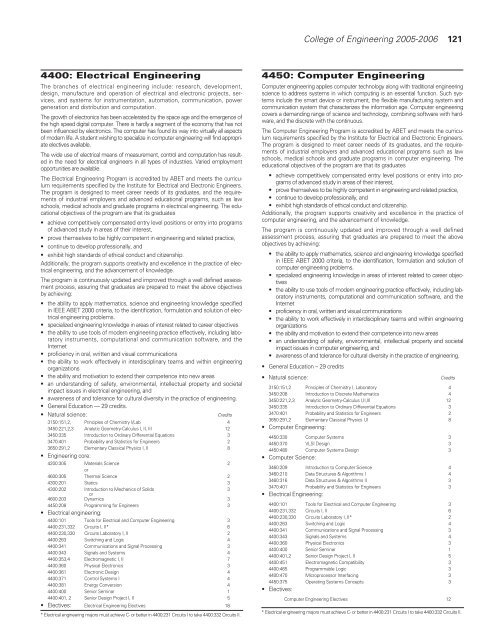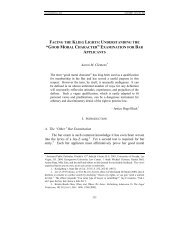Calendar 2005-2006 - The University of Akron
Calendar 2005-2006 - The University of Akron
Calendar 2005-2006 - The University of Akron
Create successful ePaper yourself
Turn your PDF publications into a flip-book with our unique Google optimized e-Paper software.
4400: Electrical Engineering<br />
<strong>The</strong> branches <strong>of</strong> electrical engineering include: research, development,<br />
design, manufacture and operation <strong>of</strong> electrical and electronic projects, services,<br />
and systems for instrumentation, automation, communication, power<br />
generation and distribution and computation.<br />
<strong>The</strong> growth <strong>of</strong> electronics has been accelerated by the space age and the emergence <strong>of</strong><br />
the high speed digital computer. <strong>The</strong>re is hardly a segment <strong>of</strong> the economy that has not<br />
been influenced by electronics. <strong>The</strong> computer has found its way into virtually all aspects<br />
<strong>of</strong> modern life. A student wishing to specialize in computer engineering will find appropriate<br />
electives available.<br />
<strong>The</strong> wide use <strong>of</strong> electrical means <strong>of</strong> measurement, control and computation has resulted<br />
in the need for electrical engineers in all types <strong>of</strong> industries. Varied employment<br />
opportunities are available.<br />
<strong>The</strong> Electrical Engineering Program is accredited by ABET and meets the curriculum<br />
requirements specified by the Institute for Electrical and Electronic Engineers.<br />
<strong>The</strong> program is designed to meet career needs <strong>of</strong> its graduates, and the requirements<br />
<strong>of</strong> industrial employers and advanced educational programs, such as law<br />
schools, medical schools and graduate programs in electrical engineering. <strong>The</strong> educational<br />
objectives <strong>of</strong> the program are that its graduates<br />
• achieve competitively compensated entry level positions or entry into programs<br />
<strong>of</strong> advanced study in areas <strong>of</strong> their interest,<br />
• prove themselves to be highly competent in engineering and related practice,<br />
• continue to develop pr<strong>of</strong>essionally, and<br />
• exhibit high standards <strong>of</strong> ethical conduct and citizenship.<br />
Additionally, the program supports creativity and excellence in the practice <strong>of</strong> electrical<br />
engineering, and the advancement <strong>of</strong> knowledge.<br />
<strong>The</strong> program is continuously updated and improved through a well defined assessment<br />
process, assuring that graduates are prepared to meet the above objectives<br />
by achieving:<br />
• the ability to apply mathematics, science and engineering knowledge specified<br />
in IEEE ABET 2000 criteria, to the identification, formulation and solution <strong>of</strong> electrical<br />
engineering problems.<br />
• specialized engineering knowledge in areas <strong>of</strong> interest related to career objectives<br />
• the ability to use tools <strong>of</strong> modern engineering practice effectively, including laboratory<br />
instruments, computational and communication s<strong>of</strong>tware, and the<br />
Internet<br />
• pr<strong>of</strong>iciency in oral, written and visual communications<br />
• the ability to work effectively in interdisciplinary teams and within engineering<br />
organizations<br />
• the ability and motivation to extend their competence into new areas<br />
• an understanding <strong>of</strong> safety, environmental, intellectual property and societal<br />
impact issues in electrical engineering, and<br />
• awareness <strong>of</strong> and tolerance for cultural diversity in the practice <strong>of</strong> engineering.<br />
• General Education — 29 credits.<br />
• Natural science: Credits<br />
3150:151,2, Principles <strong>of</strong> Chemistry I/Lab 4<br />
3450:221,2,3 Analytic Geometry-Calculus I, II, III 12<br />
3450:335 Introduction to Ordinary Differential Equations 3<br />
3470:401 Probability and Statistics for Engineers 2<br />
3650:291,2 Elementary Classical Physics I, II 8<br />
• Engineering core:<br />
4200:305 Materials Science 2<br />
or<br />
4600:305 <strong>The</strong>rmal Science 2<br />
4300:201 Statics 3<br />
4300:202 Introduction to Mechanics <strong>of</strong> Solids 3<br />
or<br />
4600:203 Dynamics 3<br />
4450:208 Programming for Engineers 3<br />
• Electrical engineering:<br />
4400:101 Tools for Electrical and Computer Engineering 3<br />
4400:231,332 Circuits I, II* 6<br />
4400:230,330 Circuits Laboratory I, II 2<br />
4400:263 Switching and Logic 4<br />
4400:341 Communications and Signal Processing 3<br />
4400:343 Signals and Systems 4<br />
4400:353,4 Electromagnetic I, II 7<br />
4400:360 Physical Electronics 3<br />
4400:361 Electronic Design 4<br />
4400:371 Control Systems I 4<br />
4400:381 Energy Conversion 4<br />
4400:400 Senior Seminar 1<br />
4400:401, 2 Senior Design Project I, II 5<br />
• Electives: Electrical Engineering Electives 18<br />
* Electrical engineering majors must achieve C- or better in 4400:231 Circuits I to take 4400:332 Circuits II.<br />
College <strong>of</strong> Engineering <strong>2005</strong>-<strong>2006</strong> 121<br />
4450: Computer Engineering<br />
Computer engineering applies computer technology along with traditional engineering<br />
science to address systems in which computing is an essential function. Such systems<br />
include the smart device or instrument, the flexible manufacturing system and<br />
communication system that characterizes the information age. Computer engineering<br />
covers a demanding range <strong>of</strong> science and technology, combining s<strong>of</strong>tware with hardware,<br />
and the discrete with the continuous.<br />
<strong>The</strong> Computer Engineering Program is accredited by ABET and meets the curriculum<br />
requirements specified by the Institute for Electrical and Electronic Engineers.<br />
<strong>The</strong> program is designed to meet career needs <strong>of</strong> its graduates, and the requirements<br />
<strong>of</strong> industrial employers and advanced educational programs such as law<br />
schools, medical schools and graduate programs in computer engineering. <strong>The</strong><br />
educational objectives <strong>of</strong> the program are that its graduates<br />
• achieve competitively compensated entry level positions or entry into programs<br />
<strong>of</strong> advanced study in areas <strong>of</strong> their interest,<br />
• prove themselves to be highly competent in engineering and related practice,<br />
• continue to develop pr<strong>of</strong>essionally, and<br />
• exhibit high standards <strong>of</strong> ethical conduct and citizenship.<br />
Additionally, the program supports creativity and excellence in the practice <strong>of</strong><br />
computer engineering, and the advancement <strong>of</strong> knowledge.<br />
<strong>The</strong> program is continuously updated and improved through a well defined<br />
assessment process, assuring that graduates are prepared to meet the above<br />
objectives by achieving:<br />
• the ability to apply mathematics, science and engineering knowledge specified<br />
in IEEE ABET 2000 criteria, to the identification, formulation and solution <strong>of</strong><br />
computer engineering problems.<br />
• specialized engineering knowledge in areas <strong>of</strong> interest related to career objectives<br />
• the ability to use tools <strong>of</strong> modern engineering practice effectively, including laboratory<br />
instruments, computational and communication s<strong>of</strong>tware, and the<br />
Internet<br />
• pr<strong>of</strong>iciency in oral, written and visual communications<br />
• the ability to work effectively in interdisciplinary teams and within engineering<br />
organizations<br />
• the ability and motivation to extend their competence into new areas<br />
• an understanding <strong>of</strong> safety, environmental, intellectual property and societal<br />
impact issues in computer engineering, and<br />
• awareness <strong>of</strong> and tolerance for cultural diversity in the practice <strong>of</strong> engineering.<br />
• General Education – 29 credits<br />
• Natural science: Credits<br />
3150:151,2 Principles <strong>of</strong> Chemistry I, Laboratory 4<br />
3450:208 Introduction to Discrete Mathematics 4<br />
3450:221,2,3 Analytic Geometry-Calculus I,II,III 12<br />
3450:335 Introduction to Ordinary Differential Equations 3<br />
3470:401 Probability and Statistics for Engineers 2<br />
3650:291,2 Elementary Classical Physics I,II 8<br />
• Computer Engineering:<br />
4450:330 Computer Systems 3<br />
4450:370 VLSI Design 3<br />
4450:480 Computer Systems Design 3<br />
• Computer Science:<br />
3460:209 Introduction to Computer Science 4<br />
3460:210 Data Structures & Algorithms I 4<br />
3460:316 Data Structures & Algorithms II 3<br />
3470:401 Probability and Statistics for Engineers 3<br />
• Electrical Engineering:<br />
4400:101 Tools for Electrical and Computer Engineering 3<br />
4400:231,332 Circuits I, II 6<br />
4400:230,330 Circuits Laboratory I, II* 2<br />
4400:263 Switching and Logic 4<br />
4400:341 Communications and Signal Processing 3<br />
4400:343 Signals and Systems 4<br />
4400:360 Physical Electronics 3<br />
4400:400 Senior Seminar 1<br />
4400:401,2 Senior Design Project I, II 5<br />
4400:451 Electromagnetic Compatibility 3<br />
4400:465 Programmable Logic 3<br />
4400:470 Microprocessor Interfacing 3<br />
4450:375 Operating Systems Concepts 3<br />
• Electives:<br />
Computer Engineering Electives 12<br />
* Electrical engineering majors must achieve C- or better in 4400:231 Circuits I to take 4400:332 Circuits II.

















